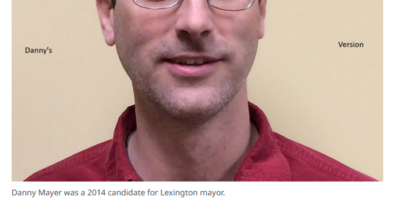Thoughts on language and action
By Patrick O’Dowd
There are two ways someone could look at Occupy Lexington’s one year anniversary rally in Phoenix Park: 1) As a grim picture of what remains of the national movement three hundred and sixty five days later; or 2) as a fair representation, for good or ill, of what the Occupy movement was from the beginning.
A pedestrian passing Lexington’s one year occupation rally might have to be forgiven for taking the former view of the movement. With a hand painted banner, a table of supplies and speaking equipment, it was not that the rally looked underprepared. It was that those remaining to remember the anniversary seemed merely to be talking to themselves, no longer meaningfully engaged — if they ever were — with the broader political moment. A harsh criticism for a local rally? Perhaps, but one that seems to reflect honestly the movement’s current condition, here in Lexington as elsewhere.
Yet, it was on the same day as New York City’s Occupy Wall Street protests that Mother Jones released the video of Mitt Romney — the one percent incarnate, if there ever was such a body — blasting forty-seven percent of the country as little more than government dependents. Romney’s reveal is a reminder that the ideas that underpinned the Occupy movement — ideas that shined a light on the rapidly growing economic disparity of this country and emphasized this colossal problem’s universal nature by invoking the first person plural “We are the 99%” — are ones at the very core of the current presidential campaign.
While speakers at the Lexington rally spoke to this essential relevance, there was an overwhelming sense that these words meant little in terms of action; little in terms of meaningful change (big or small) that would impact Lexington’s ninety nine percent, much less its members sleeping on the benches in the midst of the rally itself. This sense has less to do with their words themselves and more to do with the history of the movement. It is simply hard to take chants of “Banks got bailed out — We got sold out” seriously with the inability of the Occupy movement across the local to national spectrum to translate their anger at a system that inherently favors corporations of citizens when you strongly suspect from past experience that they have no real plan outside of continuing to chant.
The language of economic inequality and hoped for justice, which the Occupy movement both helped to form and codify, will be seen as its legacy. From the beginning, Occupy chose not to engage directly with existing political machines. That decision, as I think the past year has shown, has left the movement with little tangible evidence of success. The exception has been this language. While the Democratic Party and its chief, Obama, have not co-opted the language wholesale — a decision you can judge on your own — Occupy’s lexicon now serves dutifully in the party’s arsenal of attacks and appeals. No doubt, this is not the outcome those at the early general assemblies across the country would have imagined a year ago, but by choosing to not directly engage in politics beyond protest and occupation, they have left their words and their power to be wielded by others.
We may wish for a broader embrace of Occupy’s language from the established left but change of this sort only comes over time. This is even more exaggerated in the context of the movement’s failure to apply meaningful political pressure to those already in office, whether that be at city council or in the West Wing. In its current role, Occupy Wall Street can only serve as the vocal conscience of the Democratic Party and the left writ large. It can continue to rail, chant and beat the drums to remind Americans—members of the ninety nine percent whether they self-identify or not—that inequality exists across the spectrum; that those suffering need not do so alone; and that there is power in both language and numbers.
The question is whether or not continuing to rail, chant, and beat the drums both literal and proverbial is enough. Or are we missing another, equally important, piece to this puzzle? The flash in the pan protests in New York and the anemic gathering in Lexington suggests that we are. The speakers at the Lexington rally and the few who came simply to show support are clearly individuals dedicated to the cause whose energy is essential to the movement. However, Occupy has shied away from half the battle: channeling the energy of these individuals into something where the factory worker, student, or retiree can see an effect. The movement has left these potential members unable to answer the ever important question of “Are you better off?” with a yes.
At only one year old, Occupy Wall Street and its Lexington encampment are young political forces, but decisions must be made now if it is not to whither on the vine, leaving its innate vitality to rot or, worse, get plucked by those who may not have the movement’s interests at heart.
Sitting at the rally and listening to the speakers, looking around at the faces who filled Phoenix Park and considering my own debt-ridden future, there was an overwhelming sense that now more than ever is the time for Occupy to change gears and bring its words into action for the good of Lexington and the country. Now is no time to give up the ghost.




Leave a Reply